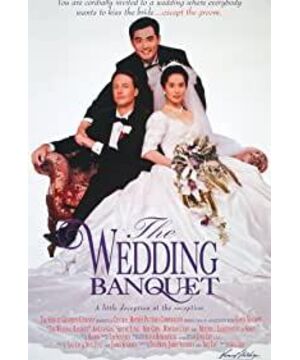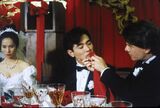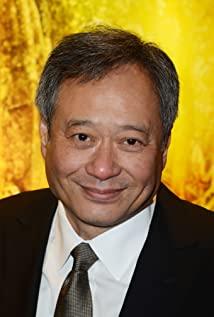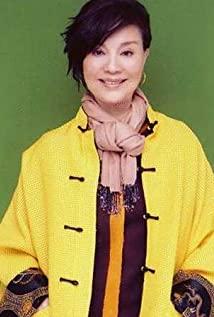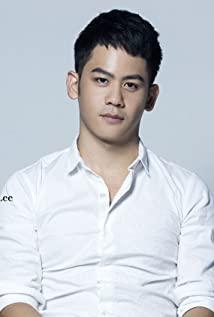The green card film was filmed in the United States, and Zhang Aijia, who is also a Taiwanese, has also filmed it. In the case of preconceived ideas, I have always felt that "Little Fisherman" follows the routine of the American film "Green Card", and there is nothing new. In Lee Ang's "Wedding Banquet," half of the reason why the hero and heroine are together is because of the green card. For the heroine Weiwei, marriage is to obtain permanent residency in the United States, even if it is just a certificate of no substantive significance. Of course, it can be seen from the details of Weiwei and Weitong getting along, that Weiwei's heart is mixed with a love for Weitong, although this is her wishful thinking. However, "The Wedding Banquet" is not around this green card after all, but the same-sex love of the male protagonist Wei Tong.
Taiwanese Wei Tong has lived in New York for ten years and has a friend Simon who has lived together for five years. Weitong's parents want to hug their grandson, and often urge Weitong to find a girlfriend. Weiwei is a tenant of Weitong. He likes to paint, but because he doesn't have a green card, he often loses his job. In order to help Weiwei and to give an explanation to Weitong's parents, Simon suggested that the two married in a fake marriage. It was a happy thing for everyone, but because of the arrival of Wei Tong's parents, accidents happened again and again.
Ang Lee's handling of family ethics topics can be said to be very familiar. In "Pushing Hands", Ang Lee expresses the differences between Chinese and Western cultures through the way his father-in-law and daughter-in-law get along. The calm Tai Chi push hand and the restless English typing constitute a very obvious cultural opposition in the film. In "The Wedding Banquet", differences still exist, but they have begun to show a gradual fusion of Chinese and Western cultures. Moreover, not only Chinese and Western cultures, but also traditional and modern ethical concepts have also been crossed in the film. The development of the father-son relationship is a sign, and the blending of the two cultures and ethics is the essence.
Gao Weitong, who appeared as an oriental image, not only studied and settled in the United States, but was also accustomed to American ethics and lifestyle. By his side, there was a homosexual who had been with him for five years. An Oriental living in the West is itself a blend of regional cultures. Five years is not a short period of time. This concept of time reflects Wei Tong's traditional emotional pursuit. More than that, Weiwei, a beautiful female guest, has repeatedly shown her good feelings for Weitong, but she has to stay away because of Weitong's determination and persistence in love. This traditional adherence to emotions and the sympathy and love in modern ethical concepts together form the unity of Gao Wei's contradiction.
The parents were not satisfied with the sloppy attitude of their son and daughter-in-law in dealing with life-long events, and insisted on a traditional ceremony. As a result, Weitong's wedding also has a compromise between two cultures, including both Western-style notarization and Chinese-style wedding banquet. The owner of Chinese restaurant Chen, a former subordinate of Wei Tong's father, volunteered to do everything. A wedding banquet unfolded like this. Making trouble in the bridal chamber, making the prestige in a daze, it makes sense to make a fake show. And Wei Tong, is it just because of being drunk?
It should be said that Wei Tong has been trying to survive in two cultures and two ethical concepts. This is for the sake of perfection, but also to strike a balance among the opposition. For balance, he has to deal with the friendship form sent by his mother; for balance, he and Weiwei act in a marriage scene; for balance, even in the end, Weitong could not bear to tell his father the truth, worrying about his father’s sickness. Can't fight.
And this kind of compromise does not exist among parents. Faced with the notarized wedding of their son and daughter-in-law, even though the parents were full of grievances and pain, they did not turn this dissatisfaction into a direct conflict. They still smiled strongly while watching the ceremony. Father's silence, mother's gaffe, and the two elders' laughter after Boss Chen promised the wedding banquet, this man's natural reaction contained sadness.
The mother finally learned the truth that her son was a homosexual, but she did not react drastically. She couldn't understand, but she still chose tolerance. In fact, it's not that Weitong's father couldn't communicate, as Weitong imagined. Only Simon knew that Wei Tong's father had understood everything on the morning of the quarrel in English. My father didn't expose him, and let them act in order to do a little bit of filial piety. I think it's not just hope that I can really hold my grandson. For the father, avoiding contradictions actually means accepting in disguise.
The three young people have found the most suitable way to deal with them, and they have also satisfied their parents' wishes. The outcome should be the best of both worlds. And this ending is also Wei Tong's father's desperate expectation. When his father left, he thanked Simon for taking care of Wei Tong, and his gratitude to Wei Wei was obviously for the incense of the Gao family. At the airport security check, the back of the father with his hands raised seems to be a metaphor for a kind of surrender. It is a surrender made by parents for the happiness of their children. It is a last resort. And this kind of concession also exists between children. Tradition and modernity do not actually need to break. Even if it's just asking for perfection, it still has its own way of being. What's more, giving in because you understand the other party always brings warmth to people.
That wedding banquet, after all, existed. In the memory of two generations, it will always exist.
View more about The Wedding Banquet reviews


